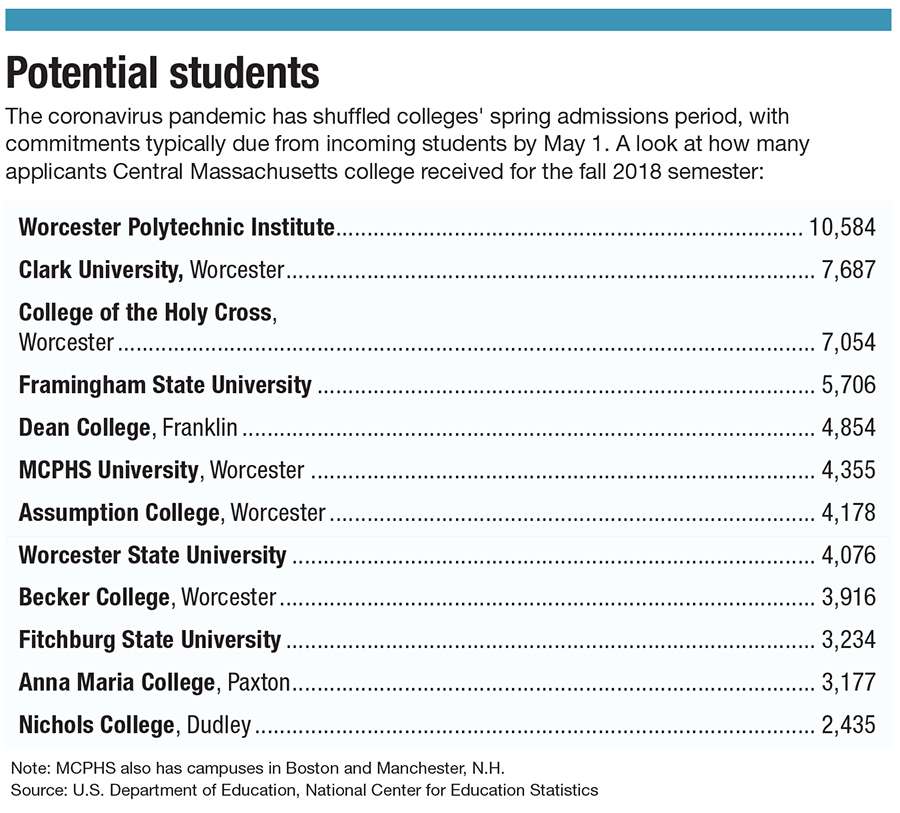
Central Mass. colleges face an uncertain future
 Photo | Grant Welker
College of the Holy Cross campus
Photo | Grant Welker
College of the Holy Cross campus
First, college leaders had to look at the coronavirus threat and make a potentially heart-wrenching decision: Should on-campus classes be canceled? Should students be sent home from their dorms?
In short order, school leaders uniformly decided yes. Then came the other hard part: quickly moving classes online while keeping staff and students safe.
Now comes the period of the unknown.
College leaders in Central Massachusetts are grappling with an upturned admissions period and wondering what fall enrollment will look like if students decide they don’t want to – or are unable to – travel far for school, or even whether a fall semester would be able to take place on campus anyway.
For a school more heavily reliant on students coming from the other side of the country or across the world, that may mean the student body at Worcester Polytechnic Institute this fall is made up of more relatively local students. For those who draw far more locally anyway, such as Fitchburg State University, the upheaval could mean more students on campus this fall.

Community colleges could be due for an upswing in the number of students as they saw during the Great Recession.
In that case, Quinsigamond Community College in Worcester, Mount Wachusett Community College in Gardner and others were flooded with people out of work looking to earn a new degree or job training to enter a new field. It could be that way again.
“Because we’re wired that way all the time, that makes us more prepared to be able to address this,” said Lee Ann Scales, the vice president of enrollment and public affairs at MWCC.
Getting operational online
Among the first things colleges had to do in March was get all their courses online so students could finish the semester remotely. That was easier for some than others.
At UMass Medical School in Worcester, for example, lectures were always recorded. Now, instructors simply talk to a camera in an empty room instead of one filled with students. UMass also made the decision to graduate its 135 four-year medical students more than a month early to allow them to help treat coronavirus patients.


“Drastic times require drastic steps,” UMass Medical School Chancellor Michael Collins said of the decision to go online, the first Central Massachusetts college to do so.
For other colleges, instructors who weren’t used to teaching online had to quickly learn the technology and tailor their curriculum to work outside the classroom.
QCC trained more than 160 instructors for online technology, with only 20% to 30% of its courses normally having an online component, President Luis Pedraja said.

“It’s been a challenging few weeks,” Pedraja said. “To redo it in an online format takes a lot of dedication.”
That challenge doesn’t end with instructors.
Many of QCC’s students are low-income, and less likely to have a computer or reliable internet connection allowing them to keep up with a course. The college’s bookstore has shipped laptops to some students and posted locations of internet hotspots to give them a connection, Pedraja said. Nearly 30 tutors have been working to lend tech support to students as well.
Enrollment in flux
The fall semester could look a lot different on local campuses – if the semester can even be held in person. College officials said they can’t know at this relatively early stage what will be possible nearly five months from now, if all the social distancing efforts will be relaxed in time for school to start.
Even long before then, campus visits normally taking place over April vacation to give high school seniors one last look before committing won’t be taking place.
“It’s really impossible to say at this point,” said Andrew Palumbo, the assistant vice president for enrollment management and dean of admissions and financial aid at WPI.
WPI canceled its summer courses in Asia early in March and brought back home students who were working on academic projects abroad. By April, people on campus are normally asking about how numbers for the incoming fall class are looking, Palumbo said.
This time, he has no answers for them. May 1 is the traditional deadline for students to commit for the fall, but WPI is working individually with students who may need more time. State universities have pushed their deadlines back to June 1.
“Parents and students are going to need more time to digest what’s happening,” said Jinawa McNeil, Fitchburg State’s director of admissions.
Even high school counselors, who McNeil said Fitchburg State typically views as an extension of their own outreach efforts, are largely helpless these days. Massachusetts high schools are closed at least through May 4.

Fitchburg State is keeping another important factor in mind: If families are giving far more consideration to costs of attendance, that should work in its favor.
“If we go into a recession, families are going to make decisions with finances in mind first,” McNeil said.
At Worcester State University, the school's annual Congratulations Day for prospective students and their families typically brings 1,000 people to meet counselors, faculty and the president and to tour campus.
"Students tell us time and time again that their campus visit was a major factor in their decision to attend Worcester State," said Joseph DiCarlo, the school's dean of enrollment and director of admissions.
This year, though, the event was moved online into three 45-minute sessions. The first session, on April 4, had 130 students participating.

Local admissions officials aren’t making any predictions on how enrollment would look in the fall. After all, colleges largely haven’t even decided how to handle graduation ceremonies unable to be held in person in May but may instead be done in some way online or at another time.
“Uncertainty is the word across the board,” Palumbo said.
If an economic recession brings more people to campuses for a new degree or job retraining, colleges are working to be ready for that, too.
QCC is already working to develop its workforce training capabilities, which could include holding courses in the evening at high schools, or in a hybrid format with some courses online.
Fitchburg State counts itself fortunate it has already grown its online MBA program and has grown three of its online graduate programs to nearly 200 students. A business administration degree completion program is entirely online.
“In that sense we’re ready,” said Alberto Cardelle, Fitchburg State’s provost and vice president for academic affairs.
MWCC has similarly focused more on online learning and is now looking at where and when it may want to or be able to offer courses this fall, particularly if it’s to a less traditional student body.
“We’re looking at all of it,” Scales said.
At UMass Medical School, enrollment could vary but one thing likely won’t: The school will fill its allotment of 162 seats. It normally has a list of applicants far longer than that, Collins said.
“I’m not worried about enrollment management,” he said.
WBJ Web Partners
Schools already experiencing severe indebtedness, like Anna Maria College, will be fighting for their very survival.













1 Comments